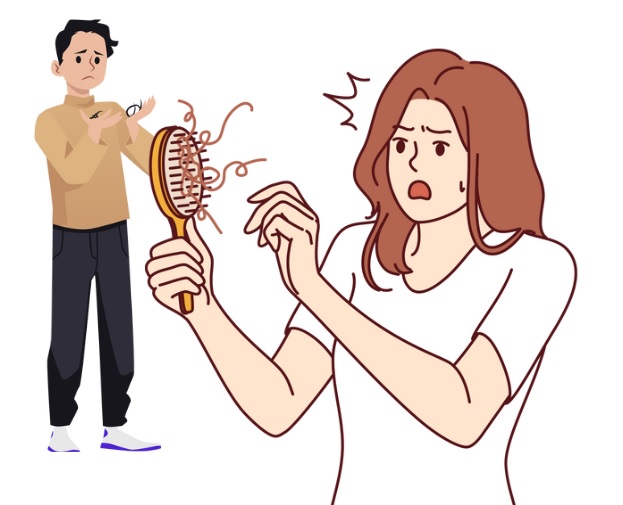What are the most common reasons for hair loss in men and women?
Hair loss, also known as alopecia, can have various causes, and the specific reason for hair loss can vary from person to person. Some common causes of hair loss include; androgenetic alopecia (male and female pattern baldness), alopecia Areata, telogen effluvium, medical conditions, medications, nutritional deficiencies, traction alopecia, trichotillomania, fungal infections, chemical treatments, menopause, age, poor hair care practices, and radiation therapy.
Many of the causes mentioned can affect men and women in equal measure, but some causes are more specific to the gender. Here, we look at some of the most common hair loss causes in men, and some of the most common reasons for thinning hair in women, too.
Most Common Hair Loss Causes in Men
Over two thirds of men experience hair loss by the age of 40. The most common cause of hair loss in men is androgenetic alopecia, commonly referred to as male pattern baldness. This condition is hereditary and primarily linked to hormonal factors. However, it is not the only cause of male hair loss. Here are some other common hair loss causes in men:Androgenetic Alopecia (Male Pattern Baldness)
This is responsible for the vast majority of hair loss in men. It is characterized by a receding hairline and thinning of hair at the crown of the head. Genetics and hormones, particularly dihydrotestosterone (DHT), play a significant role in its development.
Age
As men age, they are more likely to experience some degree of hair thinning or loss. It's a natural part of the aging process.
Hormonal Changes
Fluctuations in hormone levels, such as an increase in DHT during puberty and later in life, can contribute to male pattern baldness.
Stress
High levels of stress, whether physical or emotional, can lead to a condition called telogen effluvium, where hair follicles prematurely enter the resting phase and subsequently fall out.
Poor Nutrition
A diet lacking essential nutrients like iron, protein, and biotin can result in weak and thinning hair.
Medical Conditions
Certain medical conditions, such as thyroid disorders (hypothyroidism or hyperthyroidism), can cause hair loss in men.
Medications
Some medications, like chemotherapy drugs and certain blood pressure medications, can cause hair loss as a side effect.
Scalp Infections
Fungal infections of the scalp, such as ringworm, can cause hair loss if left untreated.
Trichotillomania
While less common in men, this psychological condition can lead to hair loss if individuals compulsively pull out their hair.
Over Styling
Excessive use of hair products, heat styling tools, and harsh hair treatments can damage hair and lead to hair loss over time.
Most Common Hair Loss Causes in Women
Around 60% of women experience thinning hair by the age of 40. Hair loss in females can be caused by a variety of factors, and the most common causes can differ from those in men. Here are some of the most common hair loss causes in women:Androgenetic Alopecia (Female Pattern Baldness)
Just like in men, androgenetic alopecia is the most common cause of hair loss in women. It results in a diffuse thinning of hair on the scalp rather than the receding hairline seen in men.
Telogen Effluvium
This condition occurs due to a significant physical or emotional stressor, such as childbirth, surgery, illness, or extreme stress. Hair follicles prematurely enter the resting (telogen) phase and then shed, leading to temporary hair thinning.
Hormonal Changes
Fluctuations in hormones, such as those during pregnancy, menopause, or the use of birth control pills, can contribute to hair loss in women.
Medical Conditions
Conditions like polycystic ovary syndrome (PCOS), thyroid disorders (hypothyroidism or hyperthyroidism), and autoimmune diseases can lead to hair loss in women.
Nutritional Deficiencies
Inadequate intake of essential nutrients, particularly iron, protein, biotin, and zinc, can cause hair thinning and loss in women.
Medications
Some medications, including certain birth control pills, blood thinners, and antidepressants, can lead to hair loss as a side effect.
Traction Alopecia
Tight hairstyles like braids, cornrows, or tight ponytails can cause hair loss in women if worn frequently over an extended period.
Scalp Conditions
Infections, such as fungal infections like ringworm, or inflammatory conditions like lichen planopilaris, can cause hair loss.
Over styling
Frequent use of harsh hair treatments, excessive heat styling, and the use of chemical products can damage hair and contribute to hair loss in women.
Menopause
Hormonal changes during menopause can lead to hair thinning and loss in women.
Alopecia Areata
This autoimmune condition can affect women as well and results in the sudden onset of bald patches on the scalp or elsewhere on the body.



Comments
Post a Comment